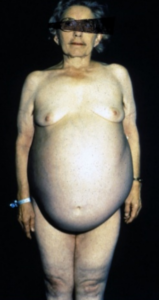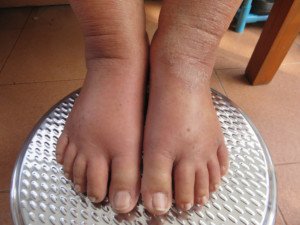
Chronic heart failure comes in four stages including what a layperson might say is mild.
Could a person have early heart failure and not know it?
Heart failure means inadequate pumping of the heart, either from a weak pump or from insufficient filling of the heart with blood before the next beat.
The result is a reduced amount of oxygenated blood circulating.
It would seem that in younger adults or those in middle age, a new-onset, increasing level of fatigue from physical exertion would get their attention a lot faster, vs. if this were happening in an 80-year-old.
A much older person would likely pass off early symptoms as a normal part of aging.
A middle age person, and especially someone in their 20s and 30s, would begin wondering what could be causing them to feel short of breath from activity that previously was no problem.
But feeling short of breath or that of not getting enough oxygen isn’t the only symptom of chronic heart failure.
Can chronic heart failure creep up without a person realizing it?
“‘Mild’ HF is not really a term that is used by healthcare professionals,” says Beth Davidson, DNP, past president of the American Association of Heart Failure Nurses.
Davidson explains, “Instead, we have ‘stages’ of HF (Stage A to Stage D).
“These stages range from patients ‘at risk’ (Stage A) to patients with end-stage disease (Stage D).
“Symptoms of HF may be slow and insidious, so yes, it can be difficult to recognize.
“In fact, at times proper diagnosis may be delayed, as patients do not recognize the most common signs/symptoms of heart failure, like shortness of breath, fatigue, abdominal bloating and edema/swelling.”
When You Don’t Realize You Have Early Heart Failure
Shortness of Breath

Freepik.com, KamranAydinov
This does not refer to a mechanical difficulty with breathing.
It means getting “out of breath” or “winded,” as when a typical person runs up a flight of stairs or trots down the street to catch their runaway puppy.
They need to breathe faster and/or deeper.
In early heart failure, one would feel short of breath from simply doing ordinary, everyday tasks that previously did not make them have to breathe harder or faster.
They’ll be taking rests when previously they never had or stopping to catch their breath. Suddenly, Saturday’s housework makes them feel taxed.
If they’re a smoker, obese or of older age, they may brush off new shortness of breath, figuring that it’s from smoking, obesity or “I’m not as young as I used to be.”
On the other hand, if heart failure is creeping up on a person who regularly exercises, the shortness of breath will be noticeable much sooner – before it begins affecting routine everyday tasks.
For instance, if someone hikes the same two mile trail every Sunday without any problem, but then they begin realizing that for the past several hikes, they had to work harder and breathe harder – this will tip them off that something is wrong.
They may still have no issues with everyday ordinary tasks, though. But eventually they will.
Fatigue

Freepik.com
A gradual development of fatigue may fly under the radar of someone with comorbidities such as smoking, obesity and older age.
In fact, in someone who’s been exceptionally stressed out lately, fatigue can be easily blamed on the stress.
Feeling fatigued on most days without any overt explanation may also be blamed on poor sleep.
You can see how easy it could be for some people to mistake the fatigue of early heart failure with lifestyle choices, stressful circumstances or “getting up there in years.”
Abdominal Bloating

Abdominal distension from ascites
Fluid in the abdomen, which is never normal, is called ascites (uh-sight-eez). This can be concealed by obesity.
In people of normal weight and especially those who are on the thin side, ascites would become much more obvious: in appearance as well as in tighter fitting pants – without having increased food intake.
A physician or nurse can tell the difference between ascites and excess fat.
The increasing girth from ascites will develop rather quickly, while the increasing girth from “age related weight gain” occurs much more slowly.
If one has been binge eating lately, or just overall taking in many more calories, enough of a weight gain will also affect their legs, perhaps their face and other areas such as making their collarbones less visible.
A slight gain in fat may stay confined to the abdomen, but in ascites, the girth keeps increasing while the rest of the body remains the same – unless a new-onset of overconsumption of food is concurrent.
You can clearly see how ascites has the potential to go unnoticed due to multiple variables.
Edema/Swelling

Edema. Shutterstock/AppleDK
This puffiness in the feet and lower legs will be less noticeable in an obese individual, and more obvious in a thinner person.
Even when a person suspects swelling or edema (excess fluid), they may brush it off as either part of aging, from too much sitting or even from premenstrual syndrome or fluctuating hormones.
Many people also simply do not look much at their legs and will have no idea that over time, they’ve developed swelling due to heart failure.
When someone has more than one symptom from the beginnings of chronic heart failure, they’ll be less likely to delay medical attention.
Stage A or High Risk for Chronic Heart Failure
Don’t wait for CHF to begin flying under your radar.
- If you smoke, quit.
- Don’t drink.
- Get moving: Do aerobic and strength exercise.
- Monitor your blood pressure; be vigilant about keeping it normal.
- Also monitor your cholesterol profile and work to keep it desirable.
- If you have diabetes, be vigilant about management.
- If you’re overweight, lose weight. Stop putting this off. Get off TikTok if you must!
 Beth Davidson is a nurse practitioner specializing in heart failure, based in Nashville, TN, and former director of the Heart Failure Disease Management Program at TriStar Centennial Medical Center in Nashville.
Beth Davidson is a nurse practitioner specializing in heart failure, based in Nashville, TN, and former director of the Heart Failure Disease Management Program at TriStar Centennial Medical Center in Nashville.
 Lorra Garrick has been covering medical, fitness and cybersecurity topics for many years, having written thousands of articles for print magazines and websites, including as a ghostwriter. She’s also a former ACE-certified personal trainer.
Lorra Garrick has been covering medical, fitness and cybersecurity topics for many years, having written thousands of articles for print magazines and websites, including as a ghostwriter. She’s also a former ACE-certified personal trainer.
.









































